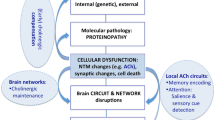Summary.
The cholinergic hypothesis of Alzheimer's disease (AD) states 1. that cholinergic neurons in the basal forebrain are severely affected in the course of disease, detectable both histopathologically by a loss of neurons and neurochemically, by a loss of marker enzymes for acetylcholine synthesis and degradation, and 2. that the resulting cerebral cholinergic deficit leads to memory loss and other cognitive and non-cognitive symptoms, which are characteristic for the illness. This hypothesis was mainly based on studies, which had been conducted on brains of patients with advanced dementia. Nevertheless, it has served as the rationale for the development of drugs, i.e. acetylcholine-esterase inhibitors (AChE-I), which have shown consistent, but modest clinical efficacy against cognitive decline and behavioural symptoms of dementia for a limited period of time. These drugs are presently regarded the standard treatment of dementia in Alzheimer's disease. Now, due to a more sensitive and reliable clinical diagnosis, neurobiological investigations can be performed on early stages of disease, when the changes detected presumably are more relevant for the pathogenesis. New studies on the pathophysiology of the cholinergic system in AD suggest 1. that the cholinergic deficit occurs only late in the disease, 2. that at the earliest stages there even is an upregulation of cholinergic activity in the brain, and 3. that an increased activity of AChE may develop under therapy with AChE-I's. These data show that there is a plasticity of the central cholinergic system in AD and that the positive clinical effects of AChE-I are to be weighted against possible detrimental effects on a pathophysiological level. These data challenge the cholinergic hypothesis in its present form, e.g. should stimulate studies on the underlying process, which leads the cholinergic system to increase its activity in patients in the early stage of AD and may have clinical consequences regarding cholinergic drug therapy.
Similar content being viewed by others
Author information
Authors and Affiliations
Additional information
Received April 9, 2002; accepted May 3, 2002
Rights and permissions
About this article
Cite this article
Frölich, L. The cholinergic pathology in Alzheimer's disease – discrepancies between clinical experience and pathophysiological findings. J Neural Transm 109, 1003–1013 (2002). https://doi.org/10.1007/s007020200083
Issue Date:
DOI: https://doi.org/10.1007/s007020200083




